 Sometimes, we wind up exactly where we are meant to be in life. For Dr. Francis Aho, DNP (Class 37), CNM, that place has been with Africa Mission Services (AMS) in Kenya since 2008. She recently opened the Africa Mission Services Women’s Health Center, an 11,000-square-foot building that includes both inpatient and outpatient services, as well as a labor and delivery wing. The birth center provides an extremely rural and underserved population with vital services that were previously administered as a small component of the AMS Community Health Clinic, which serves the Maasai tribe of the Maasai Mara National Reserve in Kenya.
Sometimes, we wind up exactly where we are meant to be in life. For Dr. Francis Aho, DNP (Class 37), CNM, that place has been with Africa Mission Services (AMS) in Kenya since 2008. She recently opened the Africa Mission Services Women’s Health Center, an 11,000-square-foot building that includes both inpatient and outpatient services, as well as a labor and delivery wing. The birth center provides an extremely rural and underserved population with vital services that were previously administered as a small component of the AMS Community Health Clinic, which serves the Maasai tribe of the Maasai Mara National Reserve in Kenya.
“This is major for us,” Aho said. “We have an outpatient department, an inpatient maternity wing, and then an OB labor and delivery wing. We started out in a little clinic building with just an exam bed, no electricity, no running water.”
In 2016, Aho and her team renovated an area of the AMS Community Health Clinic to provide more space for maternal health services, but the need for a larger, dedicated space is evident. In 2023, Aho and her team of four Kenyan midwives delivered 612 babies in a community with an estimated population of 11,000.
“It is really hard to know the actual population,” Aho said. “We are on dirt roads. If you drive down the road, it looks like nobody is around here, but they are all in little huts and homes in the bush. We also have women from farther away who come for ultrasound or specialty care such as infertility.”
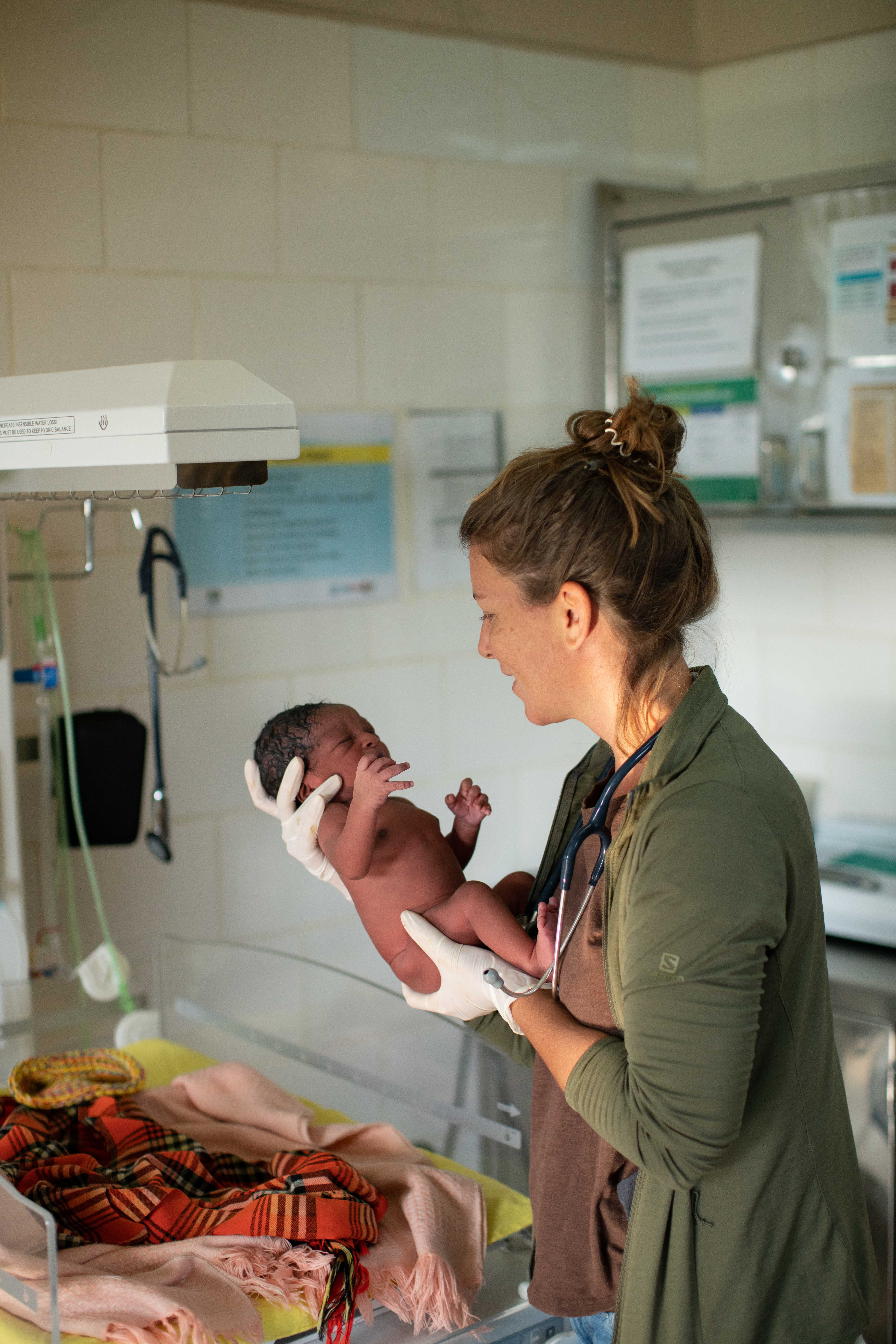 What might seem overwhelming to some is exactly the environment Aho craves. Born in Switzerland, she and her family came to the United States when she was 4, moving around a lot before settling in rural western Tennessee when she was 10. She grew up in a very religious family and often read about mission trips and mission work. Her passion for serving led her to become an ER nurse, where she found that she also thrived on the adrenaline rush of providing urgent care. She thought of becoming a flight nurse, which would be both exciting and fulfilling, but the idea of mission work was also in the back of her mind. She did some mission work in Honduras and sought a more permanent position. That’s when she found AMS. She moved to Kenya in 2008.
What might seem overwhelming to some is exactly the environment Aho craves. Born in Switzerland, she and her family came to the United States when she was 4, moving around a lot before settling in rural western Tennessee when she was 10. She grew up in a very religious family and often read about mission trips and mission work. Her passion for serving led her to become an ER nurse, where she found that she also thrived on the adrenaline rush of providing urgent care. She thought of becoming a flight nurse, which would be both exciting and fulfilling, but the idea of mission work was also in the back of her mind. She did some mission work in Honduras and sought a more permanent position. That’s when she found AMS. She moved to Kenya in 2008.
“At that time, there was a clinic – just a little building – and visiting doctors would open it up,” Aho said. “It would be open for a week and then shut down. I asked Africa Mission Services if I could come and open up the clinic full-time. I was 24 and thought I could change the world. A Kenyan provider, thank goodness, asked if he could help open it up. We came the same week. That was December 2008.”
Aho recalls losing a 5-year-old patient with malaria just three days into her time at the clinic and hiking into the village to treat pregnant women while the Kenyan provider treated the men.
“I was an ER nurse and knew nothing about women’s health,” Aho said. “I was just kind of feeling around their bellies and talking to them about nutrition. I had no clue what I was doing. That evening we delivered our first baby with a little mini Maglight. The girl who is now in charge of my office was holding the mini Maglight, and I delivered the baby.”
Despite the uneven start, Aho was hooked. Aside from a two-year hiatus from the clinic after the birth of her twins in 2014, she has remained at the clinic along with her husband, Andrew, who is the founder of AMS.
After the birth of her children, Aho’s awareness of the need for maternal care was heightened. She needed to learn more in order to better care for these women and their babies.
“I think my maternal instinct kicked in. I had to change things,” she said. “I ended up going to Frontier Nursing University and decided to become a midwife. We did a big fundraiser, got equipment, and renovated a whole area at the clinic, and that’s where we set up the birth center. I hired Kenyans who were more specialized midwives and knew maternity, and we became the Women’s Health Center.”
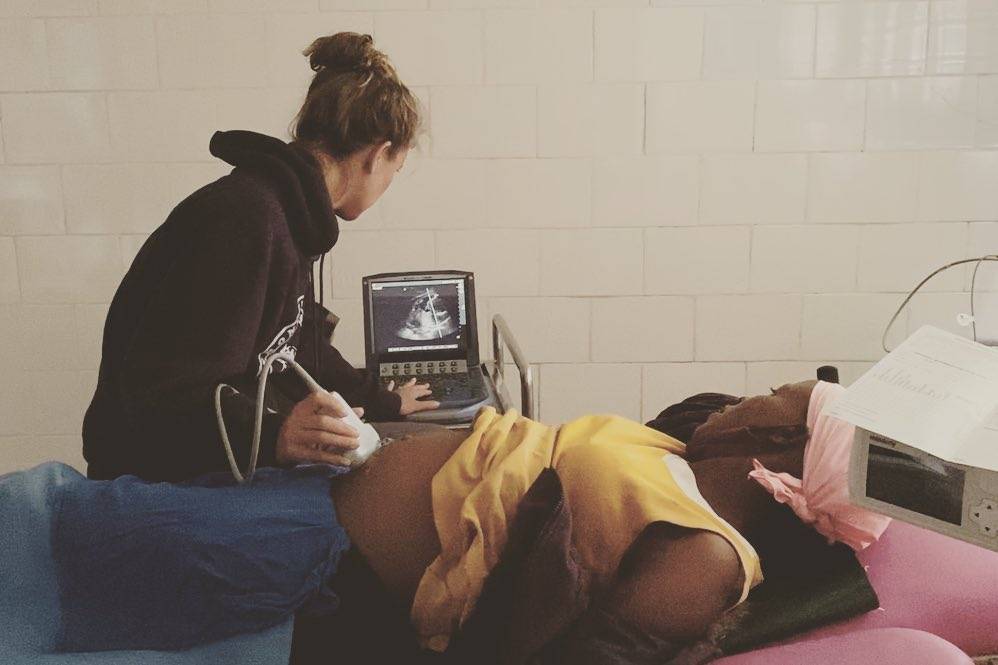 After earning her CNM at Frontier, Aho went on to get her DNP from Frontier as well. Her DNP project led to the establishment of a prenatal class at the clinic.
After earning her CNM at Frontier, Aho went on to get her DNP from Frontier as well. Her DNP project led to the establishment of a prenatal class at the clinic.
“I have learned basic OB ultrasound and taught two of my midwives,” she said. “As I was doing my DNP, I decided, as part of it, I would ultrasound all the women. I did ultrasounds on hundreds of women for my DNP project. That’s what made me learn OB ultrasound.”
Aho’s enrollment at FNU coincided with the university updating its policies to disallow clinicals being completed internationally. Aho feared she might not be able to continue.
“I was all gung-ho and ended up going to Frontier Bound that week they announced online that they were not allowing international clinical,” Aho said. “They worked with me. I went and did three months, then I flew back to Kenya for two months, and then I flew back and finished. I did my clinical in Chattanooga. For my DNP, they allowed me to do my project at my clinic. Being able to do it somewhere where I have autonomy and leadership, I was able to choose something that was very impactful for my population and clinic.”
Like many others, Aho was drawn to FNU’s mission to provide care to rural and underserved communities and populations.
“I chose Frontier because of their mission,” Aho said. “Their mission is really to give back to rural areas and underserved populations, and that really hit home with me.”
Without question, Aho certainly serves a rural and underserved area. Not only are healthcare services limited, but so are travel and overall access to care. AMS has modified a Landcruiser to serve as an ambulance able to traverse the rough and muddy dirt roads. It is over an hour’s drive to a facility that can perform a C-section and two-and-a-half hours to get to the nearest NICU.
“We are the first line for anything emergency-related in the area,” Aho said. “We deal with a lot higher risk than a birth center should, considering we don’t have C-sections, but we see patients that we will never see for prenatal care who will show up at our door ready to deliver. We have a population of HIV-positive moms, we deliver twins at least once a month. We have done triplets. We have done breach delivery. When we do an ultrasound and know that they are twins, we do the counseling and tell them they should go into town and deliver where there is a backup for C-section, but at the end of the day, they can afford to come to us, and they are going to show up.”
They can afford the care Aho and her time provide thanks to AMS being aligned with the Kenyan government’s insurance program. The government provides payment for rural women, even if they are uninsured.
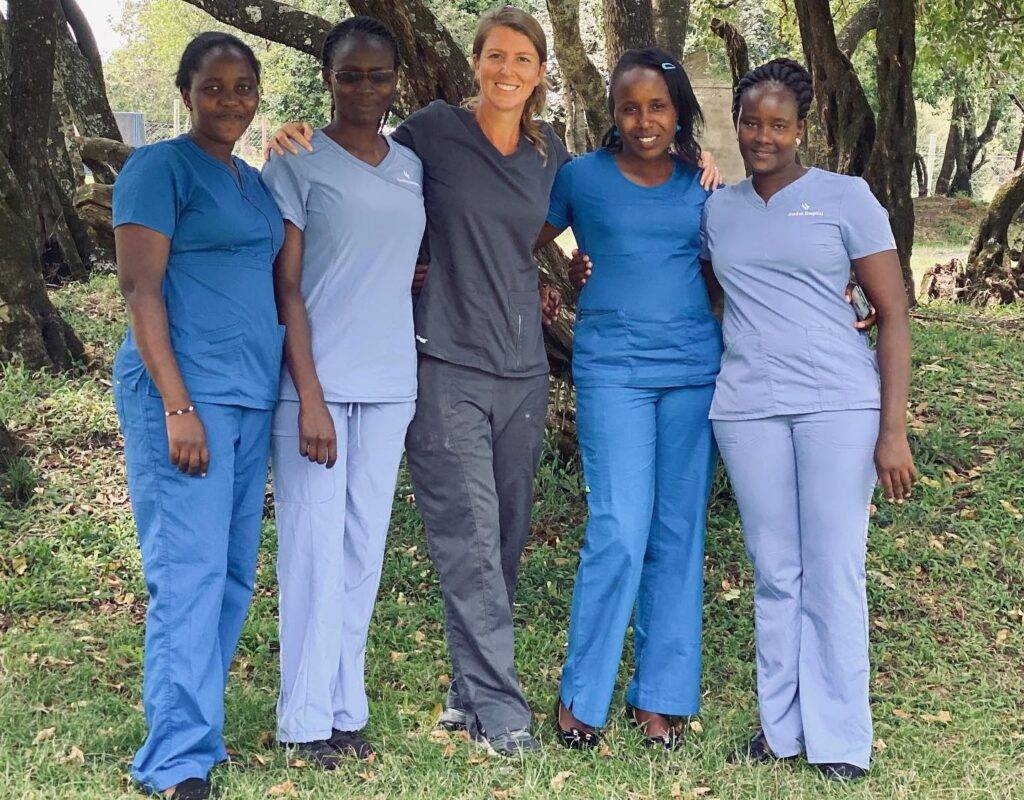 “The majority of people don’t work, and they don’t have insurance,” Aho said. “They can come to our clinic, we sign them up, and then they get four prenatal care visits, the delivery, four well-baby checkups, and the immunizations that the government will pay us for. We get about $20 for the delivery. It’s not big money, but it’s more than we could charge the locals. It does help cover our payroll, but we haven’t been paid since March of 2023.”
“The majority of people don’t work, and they don’t have insurance,” Aho said. “They can come to our clinic, we sign them up, and then they get four prenatal care visits, the delivery, four well-baby checkups, and the immunizations that the government will pay us for. We get about $20 for the delivery. It’s not big money, but it’s more than we could charge the locals. It does help cover our payroll, but we haven’t been paid since March of 2023.”
AMS, which is a nonprofit with no religious affiliation, relies on donations, fundraisers, and volunteers to help serve its mission. Volunteer medical teams, construction teams, and even landscaping teams provide much-needed physical support.
“When I have a medical team, I will go out with them, and we will set up mobile clinics in the villages that don’t have a healthcare facility, and we do free clinics under a tree,” Aho said.
With the opening of the AMS Women’s Health Center, Aho will do so with a 12-person staff, including four midwives, a lab technician, a pharmacist, and social workers who are birth assistants. Together, they are committed to providing excellent healthcare while respecting the culture and values of their patient population.
“Having a birth here is a woman’s event completely,” Aho said. “They are polygamous in general, so they come either with a co-wife, a sister, mother, some other women – and we will often have a room full of women supporting one mother. We will let mothers come into the room if women are giving birth and they want their mom or another woman to give them strength. They have certain practices like blowing air into the mom’s mouth that give them strength, conveying strength from one to the other. I try as much as possible only to educate and change things that are not healthy for the baby or mom.”
“I don’t want them to feel judged when they are giving birth,” Aho said. “I feel like I empathize with the women here. They have a tough life, and if I can make their childbirth experience safer and give them a place where they can rest and feel treated with respect and their cultural values respected, it gives me a high sense of fulfillment.”
The opening of the Women’s Health Center this summer figures to be equally fulfilling. She hopes that it will grow beyond providing maternity care to addressing other needs, such as breast cancer and cervical cancer testing and treatment.
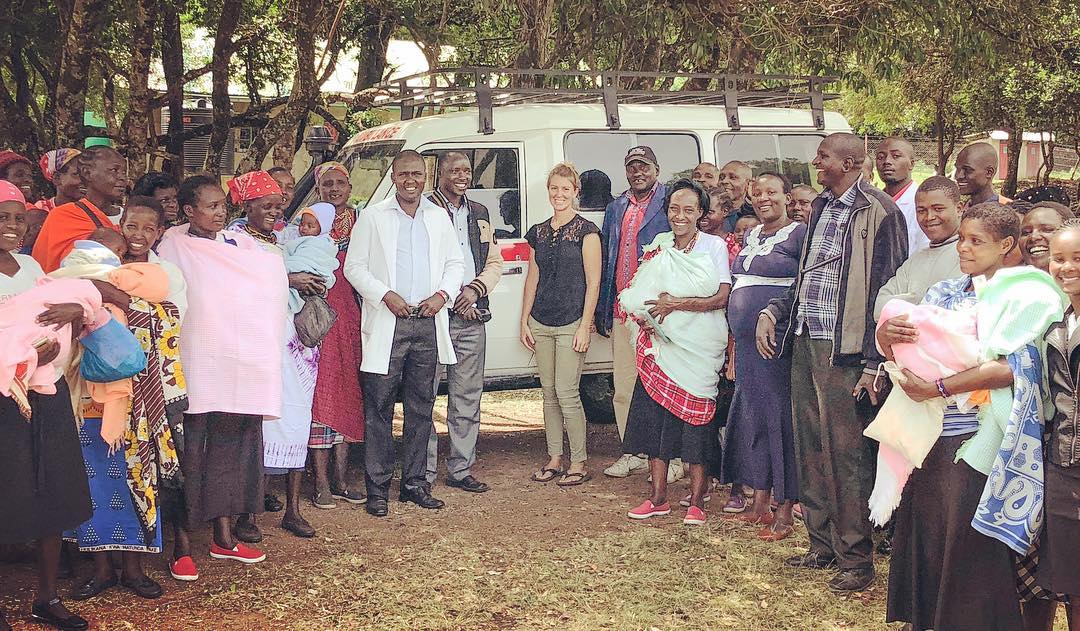
“I never came in with the idea that I could raise enough funds or start this big women’s health center,” Aho said. “My dream is that this women’s health center way outlasts me. I will feel like I have been successful if I have trained the locals to know what I know and if the center doesn’t shut down when I leave.”
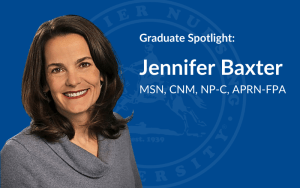
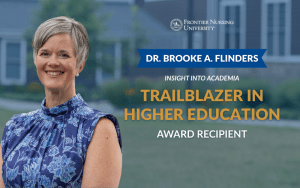




















 Carrie Belin is an experienced board-certified Family Nurse Practitioner and a graduate of the Johns Hopkins DNP program, Johns Hopkins Bloomberg School of Public Health, Georgetown University School of Nursing, and Johns Hopkins School of Nursing. She has also completed fellowships at Georgetown and the University of California Irvine.
Carrie Belin is an experienced board-certified Family Nurse Practitioner and a graduate of the Johns Hopkins DNP program, Johns Hopkins Bloomberg School of Public Health, Georgetown University School of Nursing, and Johns Hopkins School of Nursing. She has also completed fellowships at Georgetown and the University of California Irvine. Angie has been a full-scope midwife since 2009. She has experience in various birth settings including home, hospital, and birth centers. She is committed to integrating the midwifery model of care in the US. She completed her master’s degree in nurse-midwifery at Frontier Nursing University (FNU) and her Doctorate at Johns Hopkins University. She currently serves as the midwifery clinical faculty at FNU. Angie is motivated by the desire to improve the quality of healthcare and has led quality improvement projects on skin-to-skin implementation, labor induction, and improving transfer of care practices between hospital and community midwives. In 2017, she created a short film on skin-to-skin called
Angie has been a full-scope midwife since 2009. She has experience in various birth settings including home, hospital, and birth centers. She is committed to integrating the midwifery model of care in the US. She completed her master’s degree in nurse-midwifery at Frontier Nursing University (FNU) and her Doctorate at Johns Hopkins University. She currently serves as the midwifery clinical faculty at FNU. Angie is motivated by the desire to improve the quality of healthcare and has led quality improvement projects on skin-to-skin implementation, labor induction, and improving transfer of care practices between hospital and community midwives. In 2017, she created a short film on skin-to-skin called 










 Justin C. Daily, BSN, RN, has ten years of experience in nursing. At the start of his nursing career, Justin worked as a floor nurse on the oncology floor at St. Francis. He then spent two years as the Director of Nursing in a small rural Kansas hospital before returning to St. Francis and the oncology unit. He has been in his current position as the Chemo Nurse Educator for the past four years. He earned an Associate in Nurse from Hutchinson Community College and a Bachelor of Science in Nursing from Bethel College.
Justin C. Daily, BSN, RN, has ten years of experience in nursing. At the start of his nursing career, Justin worked as a floor nurse on the oncology floor at St. Francis. He then spent two years as the Director of Nursing in a small rural Kansas hospital before returning to St. Francis and the oncology unit. He has been in his current position as the Chemo Nurse Educator for the past four years. He earned an Associate in Nurse from Hutchinson Community College and a Bachelor of Science in Nursing from Bethel College. Brandy Jackson serves as the Director of Undergraduate Nursing Programs and Assistant Educator at Wichita State University and Co-Director of Access in Nursing. Brandy is a seasoned educator with over 15 years of experience. Before entering academia, Brandy served in Hospital-based leadership and Critical Care Staff nurse roles. Brandy is passionate about equity in nursing education with a focus on individuals with disabilities. Her current research interests include accommodations of nursing students with disabilities in clinical learning environments and breaking down barriers for historically unrepresented individuals to enter the nursing profession. Brandy is also actively engaged in Interprofessional Education development, creating IPE opportunities for faculty and students at Wichita State. Brandy is an active member of Wichita Women for Good and Soroptimist, with the goal to empower women and girls. Brandy is a TeamSTEPPS master trainer. She received the DASIY Award for Extraordinary Nursing Faculty in 2019 at Wichita State University.
Brandy Jackson serves as the Director of Undergraduate Nursing Programs and Assistant Educator at Wichita State University and Co-Director of Access in Nursing. Brandy is a seasoned educator with over 15 years of experience. Before entering academia, Brandy served in Hospital-based leadership and Critical Care Staff nurse roles. Brandy is passionate about equity in nursing education with a focus on individuals with disabilities. Her current research interests include accommodations of nursing students with disabilities in clinical learning environments and breaking down barriers for historically unrepresented individuals to enter the nursing profession. Brandy is also actively engaged in Interprofessional Education development, creating IPE opportunities for faculty and students at Wichita State. Brandy is an active member of Wichita Women for Good and Soroptimist, with the goal to empower women and girls. Brandy is a TeamSTEPPS master trainer. She received the DASIY Award for Extraordinary Nursing Faculty in 2019 at Wichita State University.  Dr. Sabrina Ali Jamal-Eddine is an Arab-disabled queer woman of color with a PhD in Nursing and an interdisciplinary certificate in Disability Ethics from the University of Illinois Chicago (UIC). Dr. Jamal-Eddine’s doctoral research explored spoken word poetry as a form of critical narrative pedagogy to educate nursing students about disability, ableism, and disability justice. Dr. Jamal-Eddine now serves as a Postdoctoral Research Associate in UIC’s Department of Disability and Human Development and serves on the Board of Directors of the National Organization of Nurses with Disabilities (NOND). During her doctoral program, Sabrina served as a Summer Fellow at a residential National Endowment of the Humanities (NEH) Summer Institute at Arizona State University (2023), a summer fellow at Andrew W. Mellon’s National Humanities Without Walls program at University of Michigan (2022), a Summer Research Fellow at UC Berkeley’s Othering & Belonging Institute (2021), and an Illinois Leadership Education in Neurodevelopmental and related Disabilities (LEND) trainee (2019-2020).
Dr. Sabrina Ali Jamal-Eddine is an Arab-disabled queer woman of color with a PhD in Nursing and an interdisciplinary certificate in Disability Ethics from the University of Illinois Chicago (UIC). Dr. Jamal-Eddine’s doctoral research explored spoken word poetry as a form of critical narrative pedagogy to educate nursing students about disability, ableism, and disability justice. Dr. Jamal-Eddine now serves as a Postdoctoral Research Associate in UIC’s Department of Disability and Human Development and serves on the Board of Directors of the National Organization of Nurses with Disabilities (NOND). During her doctoral program, Sabrina served as a Summer Fellow at a residential National Endowment of the Humanities (NEH) Summer Institute at Arizona State University (2023), a summer fellow at Andrew W. Mellon’s National Humanities Without Walls program at University of Michigan (2022), a Summer Research Fellow at UC Berkeley’s Othering & Belonging Institute (2021), and an Illinois Leadership Education in Neurodevelopmental and related Disabilities (LEND) trainee (2019-2020). Vanessa Cameron works for Vanderbilt University Medical Center in Nursing Education & Professional Development. She is also attending George Washington University and progressing towards a PhD in Nursing with an emphasis on ableism in nursing. After becoming disabled in April 2021, Vanessa’s worldview and perspective changed, and a recognition of the ableism present within healthcare and within the culture of nursing was apparent. She has been working since that time to provide educational foundations for nurses about disability and ableism, provide support for fellow disabled nursing colleagues, and advocate for the disabled community within healthcare settings to reduce disparities.
Vanessa Cameron works for Vanderbilt University Medical Center in Nursing Education & Professional Development. She is also attending George Washington University and progressing towards a PhD in Nursing with an emphasis on ableism in nursing. After becoming disabled in April 2021, Vanessa’s worldview and perspective changed, and a recognition of the ableism present within healthcare and within the culture of nursing was apparent. She has been working since that time to provide educational foundations for nurses about disability and ableism, provide support for fellow disabled nursing colleagues, and advocate for the disabled community within healthcare settings to reduce disparities. Dr. Lucinda Canty is a certified nurse-midwife, Associate Professor of Nursing, and Director of the Seedworks Health Equity in Nursing Program at the University of Massachusetts Amherst. She earned a bachelor’s degree in nursing from Columbia University, a master’s degree from Yale University, specializing in nurse-midwifery, and a PhD from the University of Connecticut. Dr. Canty has provided reproductive health care for over 29 years. Her research interests include the prevention of maternal mortality and severe maternal morbidity, reducing racial and ethnic health disparities in reproductive health, promoting diversity in nursing, and eliminating racism in nursing and midwifery.
Dr. Lucinda Canty is a certified nurse-midwife, Associate Professor of Nursing, and Director of the Seedworks Health Equity in Nursing Program at the University of Massachusetts Amherst. She earned a bachelor’s degree in nursing from Columbia University, a master’s degree from Yale University, specializing in nurse-midwifery, and a PhD from the University of Connecticut. Dr. Canty has provided reproductive health care for over 29 years. Her research interests include the prevention of maternal mortality and severe maternal morbidity, reducing racial and ethnic health disparities in reproductive health, promoting diversity in nursing, and eliminating racism in nursing and midwifery. Dr. Lisa Meeks is a distinguished scholar and leader whose unwavering commitment to inclusivity and excellence has significantly influenced the landscape of health professions education and accessibility. She is the founder and executive director of the DocsWithDisabilities Initiative and holds appointments as an Associate Professor in the Departments of Learning Health Sciences and Family Medicine at the University of Michigan.
Dr. Lisa Meeks is a distinguished scholar and leader whose unwavering commitment to inclusivity and excellence has significantly influenced the landscape of health professions education and accessibility. She is the founder and executive director of the DocsWithDisabilities Initiative and holds appointments as an Associate Professor in the Departments of Learning Health Sciences and Family Medicine at the University of Michigan. Dr. Nikia Grayson, DNP, MSN, MPH, MA, CNM, FNP-C, FACNM (she/her) is a trailblazing force in reproductive justice, blending her expertise as a public health activist, anthropologist, and family nurse-midwife to champion the rights and health of underserved communities. Graduating with distinction from Howard University, Nikia holds a bachelor’s degree in communications and a master’s degree in public health. Her academic journey also led her to the University of Memphis, where she earned a master’s in medical anthropology, and the University of Tennessee, where she achieved both a master’s in nursing and a doctorate in nursing practice. Complementing her extensive education, she completed a post-master’s certificate in midwifery at Frontier Nursing University.
Dr. Nikia Grayson, DNP, MSN, MPH, MA, CNM, FNP-C, FACNM (she/her) is a trailblazing force in reproductive justice, blending her expertise as a public health activist, anthropologist, and family nurse-midwife to champion the rights and health of underserved communities. Graduating with distinction from Howard University, Nikia holds a bachelor’s degree in communications and a master’s degree in public health. Her academic journey also led her to the University of Memphis, where she earned a master’s in medical anthropology, and the University of Tennessee, where she achieved both a master’s in nursing and a doctorate in nursing practice. Complementing her extensive education, she completed a post-master’s certificate in midwifery at Frontier Nursing University.









 Dr. Tia Brown McNair is the Vice President in the Office of Diversity, Equity, and Student Success and Executive Director for the Truth, Racial Healing, and Transformation (TRHT) Campus Centers at the American Association of Colleges and Universities (AAC&U) in Washington, DC. She oversees both funded projects and AAC&U’s continuing programs on equity, inclusive excellence, high-impact practices, and student success. McNair directs AAC&U’s Summer Institutes on High-Impact Practices and Student Success, and TRHT Campus Centers and serves as the project director for several AAC&U initiatives, including the development of a TRHT-focused campus climate toolkit. She is the lead author of From Equity Talk to Equity Walk: Expanding Practitioner Knowledge for Racial Justice in Higher Education (January 2020) and Becoming a Student-Ready College: A New Culture of Leadership for Student Success (July 2016 and August 2022 Second edition).
Dr. Tia Brown McNair is the Vice President in the Office of Diversity, Equity, and Student Success and Executive Director for the Truth, Racial Healing, and Transformation (TRHT) Campus Centers at the American Association of Colleges and Universities (AAC&U) in Washington, DC. She oversees both funded projects and AAC&U’s continuing programs on equity, inclusive excellence, high-impact practices, and student success. McNair directs AAC&U’s Summer Institutes on High-Impact Practices and Student Success, and TRHT Campus Centers and serves as the project director for several AAC&U initiatives, including the development of a TRHT-focused campus climate toolkit. She is the lead author of From Equity Talk to Equity Walk: Expanding Practitioner Knowledge for Racial Justice in Higher Education (January 2020) and Becoming a Student-Ready College: A New Culture of Leadership for Student Success (July 2016 and August 2022 Second edition).